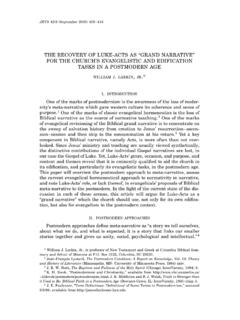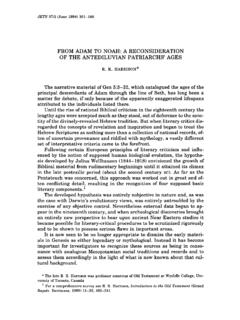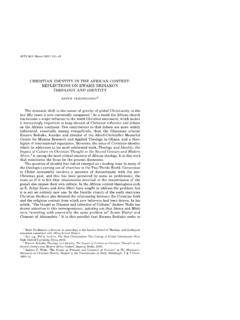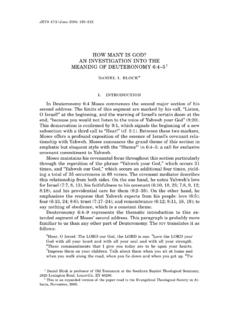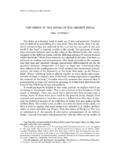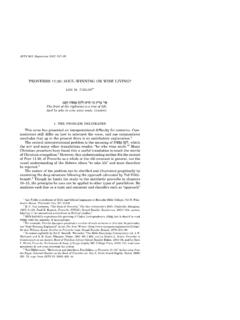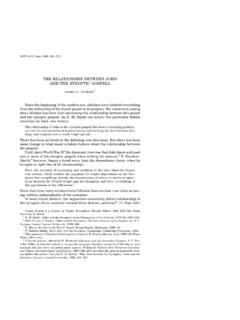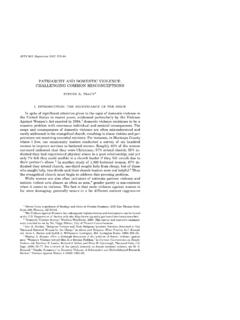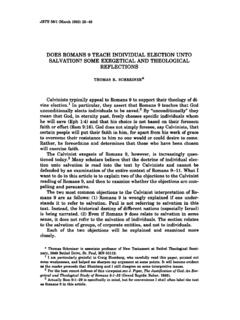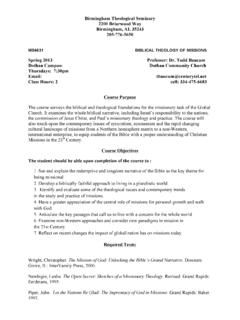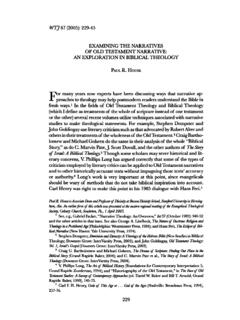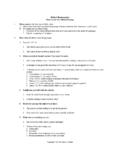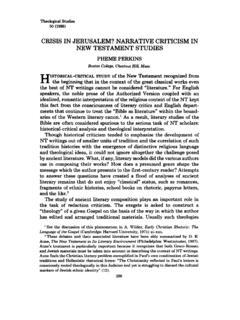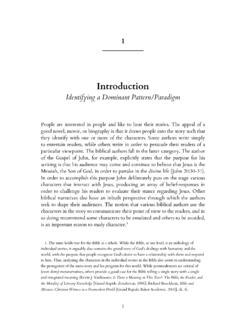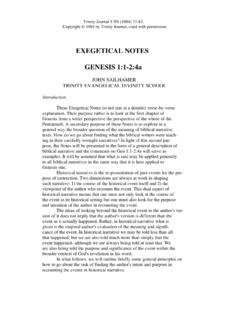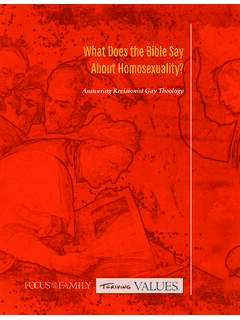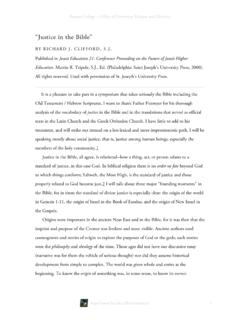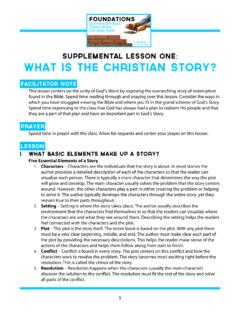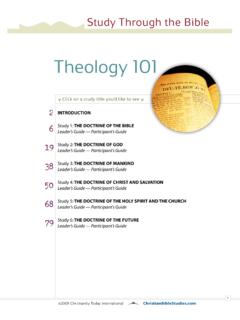Transcription of LELAND RYKEN'S LITERARY APPROACH TO …
1 JETS 37/1 ( M a r ch 1994) 1 1 5 !1 24 LELAND RYKEN'S LITERARY A P P R O A CH TO biblical I N T E R P R E T A T I O N: AN evangelical M O D EL ROBERT A. W E A T H E R S* The increasing use of LITERARY approaches in biblical interpretation has left many evangelicals baffled. They usually take a stand either in opposi-tion to this shift in interpretation , seeing it as another liberal intrusion, or they search for an acceptable way to integrate a LITERARY perspective into a grammatico!historical methodology without surrendering an evan-gelical view of inspiration. Actually no extreme is necessary for an evan-gelical model or acquisition of a LITERARY APPROACH . LITERARY approaches emphasize LITERARY portions of the Bible and often insist t h at LITERARY artifice is the Bible's primary characteristic.
2 The popu-larity of LITERARY approaches has arisen in part from the disillusionment that interpreters feel with the historical!critical method. Whereas histori-cal methodology divides and subdivides texts for study, a LITERARY ap-proach seeks the unity of the text, trying to make connections with the LITERARY nature of the canon, the book, and the immediate context. Advocates of a LITERARY APPROACH to biblical interpretation conceive of the shift away from the historical!critical method as a paradigm shift in herme!neutics. The shift in hermeneutical emphasis accompanies the current shift in western thought from the modern to the postmodern era. Cartesian du-alism characterized the modern age and resulted in the mechanistic para-digms t h at saturated many disciplines.
3 LITERARY scholars advance t h at the historical!critical method, a product of modernism, has failed to bring unified meaning to the biblical text for the Christian community. They in-sist t h at the fragmentation t h at exists within theology proves their Such scholars praise the LITERARY APPROACH "as an innovation in inter-pretation and not simply another tool comparable to source, form, or redac-tion criticism."2 They believe t h at it is the only way to view Scripture as a unity. LITERARY critics maintain t h at textual unity results in LITERARY ap-proaches for two reasons. (1) As Northrop Frye states, the Bible "is as lit-erary as it can be without actually being literature."3 That is, although one cannot apply all of the characteristics of secular literature to the Bible, it * R o b e rt W e a t h e rs is d i r e c t or of m i n i s t ry at D u d l ey S h o a ls B a p t i st C h u r c h, 3146 B o w m an Road, G r a n i te F a l l s, NC 28630 1 M Ellingsen, The Integrity of biblical Narrative Story in Theology and Proclamation (Min-neapolis F o r t r e s s, 1990) 9 !
4 10 2 Longman, LITERARY Approaches to biblical interpretation ( G r a nd R a p i ds Z o n d e r v a n, 1987)5 3 Frye, The Great Code The Bible and Literature ( P r i n c e t on P r i n c e t on U n i v e r s i t y, 1957) 62 116 JOURNAL OF THE evangelical THEOLOGICAL SOCIETY is c e r t a i n ly a l i t e r a ry w o rk (2) To r e ad t he Bible as l i t e r a t u re "is to r e s t o re the b a l a n c e, to focus a t t e n t i on once m o re on t he finished p r o d u ct "4 T he a p-proach is s y n c h r o n ic a nd seldom focuses on t he h i s t o r i c al d e v e l o p m e nt of the t e x ts I n s t e ad l i t e r a ry critics e m p h a s i ze t he u n i ty of t he Bible in i ts present form Evangelicals face t he c h a l l e n ge of d e v e l o p i ng a biblical h e r m e n e u t ic with a l i t e r a ry a p p r o a ch t h at avoids t wo c o m m on pitfalls F i r s t, t he sub-jective.
5 L i b e r al s c h o l a rs g e n e r a l ly view a ny n a r r a t i ve or l i t e r a ry t e xt of Scripture as d u b i o us in i ts h i s t o r i c al r e l i a b i l i ty T h ey often r e g a rd it as fiction a nd m ay e v en d i s r e g a rd it as in e r r or O t h er s u b j e c t i v i s ts d i s m i ss the a u t h o r i al i n t e nt of t he t e x t, a p e r s p e c t i ve t h at spells d e a th to biblical hermeneutics b a s ed on h i s t o r i c al r e v e l a t i on 5 T he second pitfall h a u n ts conservative, r a t i o n a l i s t ic i n t e r p r e t e rs T h e se s c h o l a rs i g n o re t he m o re lit-erary p a s s a g es of S c r i p t u r e, often h a v i ng no m e a ns by w h i ch to i n t e g r a te the t e x ts i n to a h e r m e n e u t ic t h at calls for s t r i ct l i t e r a l i sm in t he proposi!
6 Tional t e x ts In t he final a n a l y s i s, e v a n g e l i c a ls n e ed "a c r i t i c al u se of r e c e nt LITERARY a p p r o a c h es w i t h in t he c o n t e xt of e v a n g e l i c al p r e s u p p o s i t i o ns "6 LELAND R y k e n 's w o rk offers s u ch a p a r a d i g m, b o th c o n s i s t e nt w i th evangelical p r e s u p p o s i t i o ns a nd useful w i t h in t he f r a m e w o rk of c o n t e m p o-rary l i t e r a ry i n t e r p r e t a t i on He believes t h at e v a n g e l i c a ls are witnessing a paradigm shift in how biblical scholars study and discuss the Bible This shift involves not only a growing awareness t h at much of the Bible is literature but also a tendency to use the methods of LITERARY criti-cism when analyzing the Bible Evangelicals should participate in this move-ment.
7 Which holds immense promise but which to date has been dominated by nonevangehcals 7 The p r e s e nt e s s ay is an effort to e x a m i ne R y k e n 's w o rk in t he c o n t e xt of recent l i t e r a ry a p p r o a c h es to biblical i n t e r p r e t a t i on a nd w i th a view to-ward a d v a n c i ng e v a n g e l i c al p a r t i c i p a t i on in t h is m o v e m e nt To f a c i l i t a te my e x a m i n a t i o n, I will s u r v ey R y k e n 's m e t h o d o l o gy a l o n g s i de two o t h er LITERARY critics Amos Wilder a nd N o r t h r op F r ye E a ch s c h o l ar a p p r o a c h es the biblical t e xt w i th s i m i l ar a s s u m p t i o ns a b o ut i ts l i t e r a ry n a t u r e, b ut each differs in h is o v e r a ll view of t he n a t u re of t he biblical t e x ts a nd t he uses of i m a g e ry a nd s y m b o l i sm in t he Bible F i n a l l y, as a c a se s t u dy for interpretation t he view of e a ch a u t h or is a p p l i ed t o w a rd t he m o st l i t e r a ry of all biblical books, t he Apocalypse of J o hn T he s c h o l a r s' differences a re demonstrated in t h e ir a p p l i c a t i o ns to t he Apocalypse 4 R W r i g h t, Theology and Literature ( C a m b r i d ge B a s il Blackwell, 1989) 42 J V a n h o o z e r, " T he L a mp in t he L a b y r i n th T he H e r m e n e u t i cs of ' A e s t h e t i c' Theology," Trinity Journal 8 ( S p r i ng 1987) 2 8 !
8 31 6 J Newport, " T he C h a l l e n ge of R e c e nt L i t e r a ry A p p r o a c h es to t he Bible," Beyond the Im passe2 Scripture interpretation , and Theology in Baptist Life (ed R James a nd D S Dock ery, N a s h v i l le B r o a d m a n, 1992) 64 7 L R y k e n, " ' W o r ds of D e l i g h t' T he Bible as L i t e r a t u r e ," BSac 147 ( J a n u a r y !M a r ch 1990) 3 LELAND RYKEN'S LITERARY APPROACH TO biblical interpretation 1 17 I. A M OS W I L D E R! T HE B I B LE AS U N I Q UE L I T E R A T U RE A g e n re is t he l i t e r a ry form or t y pe t h at is u s ed to convey m e a n i ng in a work of l i t e r a t u r e. By e x a m i n i ng t he g e n r e, a critic s h o u ld be able to u n-derstand a w o rk in r e l a t i on to o t h er w o r k s. W r a p p ed in t he g e n r e, t h e r e-fore, is t he i n t e r p r e t e r 's e x p e c t a t i on as he or s he a p p r o a c h es t he t e x t.
9 Nevertheless g e n e r ic t h e o ry is p r o b l e m a t i c, for few g e n r es a re u n i v e r s a l ly recognized or i n t e r p r e t ed in t he s a me w a y .8 For Wilder, t he Bible's d i s t i n c t i v e n e ss as l i t e r a t u re lies in i ts g e n e r ic uniqueness, w h i ch is d e m o n s t r a t ed w h en it is c o m p a r ed w i th classical lit-erature. He p r o p o s es t h at t he biblical forms c a n n ot be d i f f e r e n t i a t ed from their c o n t e n t. T he forms a re i n h e r e n t ly t i ed to t h e ir s e t t i n g s. H a v i ng evolved from t he o r al t r a d i t i o ns t h at give t h em t h e ir c o n t e n t, t he biblical texts a re w r i t t en in p e c u l i ar l i t e r a ry forms a nd expose t he u n i q ue experi-ences of t he people of t h at t i m e.
10 T h e r e f o re biblical t e x ts c a n n ot be s t u d i ed in t he s a me w ay as o t h er l i t e r a t u r e .9 How does one recognize t he differ-ence? T he d i s t i n g u i s h i ng m a rk of C h r i s t i an l i t e r a t u r e, Wilder c l a i m s, "is the divine a c t i on a nd c o v e n a n t !d i a l o g u e . "10 F u r t h e r m o re t he difficulty of s t u d y i ng t he biblical g e n r es d e m o n s t r a t es their u n i q u e n e s s. In fact, e v en d e s i g n a t i ng t he w o r ks of t he Bible as "liter-ature" is u n s a t i s f a c t o ry a nd m i s l e a d i n g. Wilder believes t h at t he " u s u al tools for r h e t o r i c al g e n r es a nd forms a re at h o me in t he classical a nd h u-manist t r a d i t i o n s" b ut a re i n a d e q u a te w h en a p p l i ed to t he biblical t e x t s.
